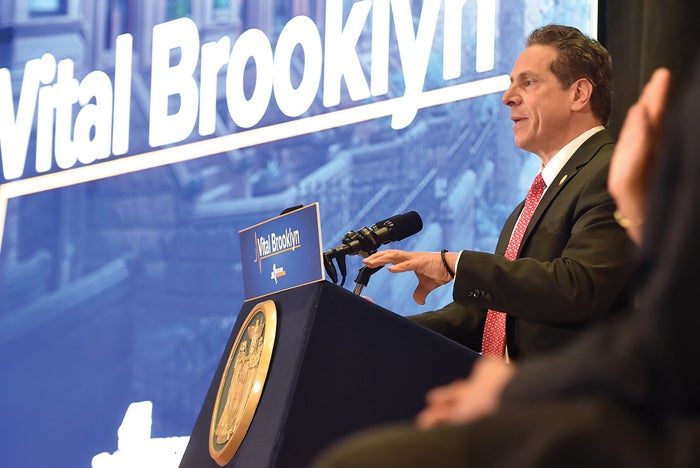Hospitals partner to create healthy and affordable housing

Gov. Cuomo announces $1.4 billion to revitalize access to health care and affordable housing.
Photo courtesy of Mike Groll/Office of New York Gov. Andrew M. Cuomo
From hospitals that operate community gardens in food deserts to outpatient facilities with on-site fitness centers focusing on wellness, the goal to keep patients from becoming inpatients has caused many organizations to think beyond the hospital’s walls. Hospitals even are reaching beyond the patient community with initiatives to fight homelessness and address poor housing conditions.
Dignity Health, for instance, partners with Lutheran Social Services of Northern California on the Housing with Dignity program that hosts five transitional apartment units in which homeless individuals can live while receiving holistic health care services, including medication management, behavioral health, primary care and life-skills training. Other hospitals have taken their commitments a step further with a deeper role in building and/or helping to support the physical environment aspects of affordable and healthy housing.
Four New York City hospitals are partnering with the state in a $1.4 billion investment called Vital Brooklyn. The initiative, spearheaded by Gov. Andrew M. Cuomo and backed not only by the area’s hospitals but also other community partners, touches nearly every aspect of community health, from resiliency to education. Affordable housing with an integrated ambulatory care network also is a key component of the initiative.
Vital Brooklyn is entering Phase 2 of its program and recently announced that five units encompassing more than 2,000 affordable homes will be developed at three sites owned by the state or the hospitals themselves: Three units will be located on the grounds of Interfaith Medical Center; one will be owned by Brookdale University Hospital Medical Center; and another will be owned by the Brooklyn Developmental Center. The developments make up two-thirds of Vital Brooklyn’s goal of creating 3,000 units of affordable housing with health care integrated into the heart of them. Kingsbrook Jewish Medical Center also will repurpose portions of its campus to create new affordable housing. Each project will include an ambulatory care center, part of Vital Brooklyn’s goal to create 32 ambulatory care centers embedded in affordable housing communities.
“In order to ensure the health of our communities, we must enact comprehensive and holistic programs,” explains Letitia James, a public advocate of Vital Brooklyn. “Vital Brooklyn understands on a fundamental level [that] true health also takes creating affordable housing.”
Kaiser Permanente is another health system putting a stake in the fight for affordable housing and healthy living. The system, with locations throughout the country, announced more than $200 million in impact investment through its Thriving Communities Fund. The investment will focus on three factors: preventing displacement or homelessness of lower- and middle-income households in rapidly changing communities; reducing homelessness by ensuring access to supportive housing; and making affordable homes healthier and more environmentally sound.
Kaiser will invest in the physical environment with a focus on affordable housing preservation and construction, and neighborhood revitalization. Its investments will include improvements that address major health risks in existing units, such as removing lead paint or pipes and mold, and ventilation issues. It also will assess opportunities to optimize homes through retrofits, such as modifying layouts for seniors to age in place. Additionally, the system plans to implement sustainable measures that support healthy living to lower residents’ utility costs; enhance their connection to nature; protect the environment; and advance the health of ecosystems.
“Many communities we serve are grappling with some of the highest rates of housing insecurity and homelessness in the United States,” says Bechara Choucair, M.D., Kaiser Permanente’s chief community health officer. “I’ve provided medical care to the homeless, and have seen the impact that living without a home can have on health.”




